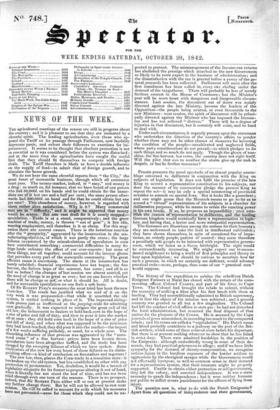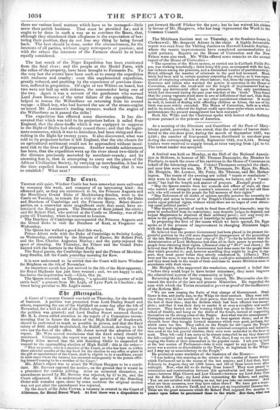The history of the expedition to subdue the rebellious Dutch
Emigrant Farmers at Natal has closed with the return of the com- manding officer, Colonel CLOETE, and part of his force, to Cape Town. The Colonel had brought the rebels to submit, without the necessity of striking a blow after his first brush with them at landing. They had unconditionally submitted to British supremacy,_ and in that the object of his mission was achieved ; and a general amnesty was granted to all but a few ringleaders. The Colonel had left the conduct of civil affairs in static quo : he had not disturbed the local administration, but reserved the final disposal of that matter for the pleasure of the Crown. He is accused by the Cape journals of gross misconduct, in according too much to the conquered rebels ; and his terms are called a "capitulation." His Dutch name and blood probably contribute to a jealousy on the part of the Bri- tish settlers, which some of them evinced even before his departure. But there is at present nothing whatever to show that he has failed in strict duty. There were admitted hardships in the position of the Emigrants : although undoubtedly wrong in some of their de- mands, they had practical grievances to allege; and if we have little sympathy for the demand of slavery-compensation, we recognize serious injury in the heedless exposure of the border settlers to aggressions by the aboriginal savages while the Government would not effectually interpose, as well as common sense in their demand for a representative system, that their interests might he properly supported. Unable to obtain either protection or self-government, they left the colony, and asserted independence. It was a state necessity to quash the independence ; but it were neither humane nor politic to inflict severe punishment for the offence of flying from injury.
The question now is, what to do with the Dutch Emigrants? Apart from al A questions of indeFendence and state government, there are various local matters which have to be managed—little more than parish business. That must be provided for; and it ought to be done in such a way as to convince the Boers that, although they abandoned their allegiance in the expectation Of bet- tering their position, they do not lose any thing by being forced back. The best should be done, under the circumstances, for the interests of all parties, without angry retrospects or passion ; and with the others the interests of the Farmers should be at least equally considered.



























